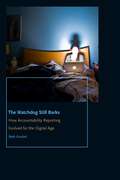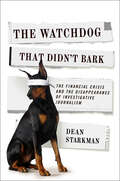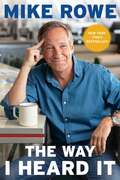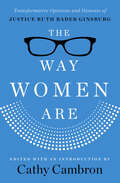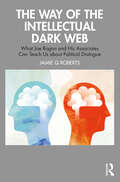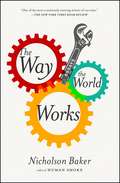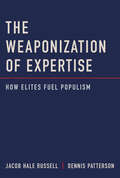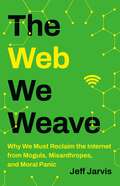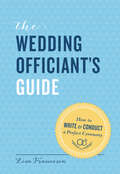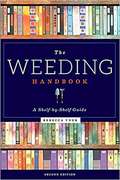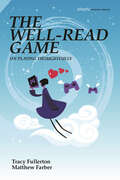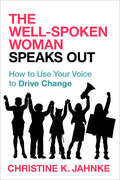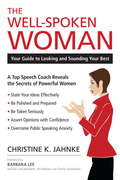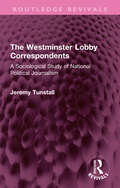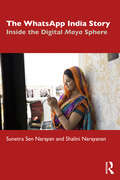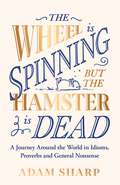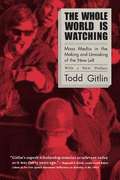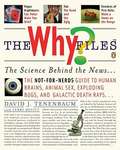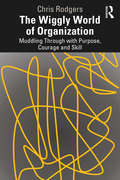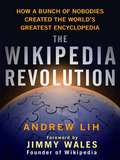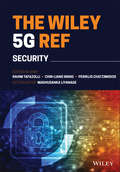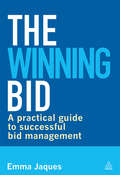- Table View
- List View
The Watchdog Still Barks: How Accountability Reporting Evolved for the Digital Age (Donald McGannon Communication Research Center's Everett C. Parker Book Series)
by Beth KnobelPerhaps no other function of a free press is as important as the watchdog role—its ability to monitor the work of the government. It is easier for politicians to get away with abusing power—wasting public funds and making poor decisions—if the press is not shining its light with what is termed “accountability reporting.” This need has become especially clear in recent months, as the American press has come under virulent direct attack for carrying out its watchdog duties. Upending the traditional media narrative that watchdog accountability journalism is in a long, dismaying decline, The Watchdog Still Barks presents a study of how this most important form of journalism came of age in the digital era at American newspapers.Although the American newspaper industry contracted significantly during the 1990s and 2000s, Fordham professor and former CBS News producer Beth Knobel illustrates through empirical data how the amount of deep watchdog reporting on the newspapers’ studied front pages generally increased over time despite shrinking circulations, low advertising revenue, and pressure to produce the kind of soft news that plays well on social media. Based on the first content analysis to focus specifically on accountability journalism nationally, The Watchdog Still Barks examines the front pages of nine newspapers located across the United States to paint a broad portrait of how public service journalism has changed since 1991 as the advent of the Internet transformed journalism. This portrait of the modern newspaper industry shows how papers of varying sizes and ownership structures around the country marshaled resources for accountability reporting despite significant financial and technological challenges.The Watchdog Still Barks includes original interviews with editors who explain why they are staking their papers’ futures on the one thing that American newspapers still do better than any other segment of the media: watchdog and investigative reporting.
The Watchdog That Didn't Bark: The Financial Crisis and the Disappearance of Investigative Journalism (Columbia Journalism Review)
by Dean StarkmanThe Pulitzer Prize-winning reporter details &“how the U.S. business press could miss the most important economic implosion of the past eighty years&” (Eric Alterman, media columnist for The Nation). In this sweeping, incisive post-mortem, Dean Starkman exposes the critical shortcomings that softened coverage in the business press during the mortgage era and the years leading up to the financial collapse of 2008. He examines the deep cultural and structural shifts—some unavoidable, some self-inflicted—that eroded journalism&’s appetite for its role as watchdog. The result was a deafening silence about systemic corruption in the financial industry. Tragically, this silence grew only more profound as the mortgage madness reached its terrible apogee from 2004 through 2006. Starkman frames his analysis in a broad argument about journalism itself, dividing the profession into two competing approaches—access reporting and accountability reporting—which rely on entirely different sources and produce radically different representations of reality. As Starkman explains, access journalism came to dominate business reporting in the 1990s, a process he calls &“CNBCization,&” and rather than examining risky, even corrupt, corporate behavior, mainstream reporters focused on profiling executives and informing investors. Starkman concludes with a critique of the digital-news ideology and corporate influence, which threaten to further undermine investigative reporting, and he shows how financial coverage, and journalism as a whole, can reclaim its bite. &“Can stand as a potentially enduring case study of what went wrong and why.&”—Alec Klein, national bestselling author of Aftermath &“With detailed statistics, Starkman provides keen analysis of how the media failed in its mission at a crucial time for the U.S. economy.&”—Booklist
The Watchdog That Didn’t Bark: The Financial Crisis and the Disappearance of Investigative Journalism (Columbia Journalism Review Books)
by Dean StarkmanIn this sweeping, incisive post mortem, Dean Starkman exposes the critical shortcomings that softened coverage in the business press during the mortgage era and the years leading up to the financial collapse of 2008. He locates the roots of the problem in the origin of business news as a market messaging service for investors in the early twentieth century. This access-dependent strain of journalism was soon opposed by the grand, sweeping work of the muckrakers. Propelled by the innovations of Bernard Kilgore, the great postwar editor of the Wall Street Journal, these two genres merged when mainstream American news organizations institutionalized muckraking in the 1960s, creating a powerful guardian of the public interest. Yet as the mortgage era dawned, deep cultural and structural shifts—some unavoidable, some self-inflicted—eroded journalism's appetite for its role as watchdog. The result was a deafening silence about systemic corruption in the financial industry. Tragically, this silence grew only more profound as the mortgage madness reached its terrible apogee from 2004 through 2006.Starkman frames his analysis in a broad argument about journalism itself, dividing the profession into two competing approaches—access reporting and accountability reporting—which rely on entirely different sources and produce radically different representations of reality. As Starkman explains, access journalism came to dominate business reporting in the 1990s, a process he calls "CNBCization," and rather than examining risky, even corrupt, corporate behavior, mainstream reporters focused on profiling executives and informing investors. Starkman concludes with a critique of the digital-news ideology and corporate influence, which threaten to further undermine investigative reporting, and he shows how financial coverage, and journalism as a whole, can reclaim its bite.
The Way Hollywood Tells It: Story and Style in Modern Movies
by David BordwellAn essay on Hollywood storytelling, showing how storytelling has (and has not) changed since the end of the studio era.
The Way I Heard It: True Tales For The Curious Mind With A Short Attention Span
by Mike RoweExecutive producer and host Mike Rowe presents a delightfully entertaining, seriously fascinating collection of his favorite episodes from America’s #1 short-form podcast, The Way I Heard It, along with a host of personal memories, ruminations, and insights. It’s a captivating must-read. <P><P>The Way I Heard It presents thirty-five mysteries “for the curious mind with a short attention span.” Every one is a trueish tale about someone you know, filled with facts that you don’t. Movie stars, presidents, bloody do-gooders, and villains—they’re all here, waiting to shake your hand, hoping you’ll remember them. <P><P>Delivered with Mike’s signature blend of charm, wit, and ingenuity, their stories are part of a larger mosaic—a memoir full of surprising revelations, sharp observations, and intimate, behind-the-scenes moments drawn from Mike’s own remarkable life and career. <P><P><b>A New York Times Bestseller</b>
The Way Women Are: Transformative Opinions and Dissents of Justice Ruth Bader Ginsburg
by Cathy CambronA collection of US Justice Ruth Bader Ginsburg&’s legal writings spanning her career, featuring her arguments, opinions, and dissents. US Supreme Court Justice Ruth Bader Ginsburg spent her life defying notions about women. She garnered the status of a cultural icon, the &“Notorious RBG.&” Her life story is inspirational, and her work ethic is aspirational. Ginsburg&’s dissents on behalf of liberal values have been lauded. She has been the subject of films and books, and her image has even been featured on everything from T-shirts to scented candles. But what is known about how her viewpoint shaped the development of law in the United States from the 1970s to 2020? The Way Women Are collects a broad range of Justice Ginsburg&’s legal writings, shedding light on who she was and what she contributed to American jurisprudence. The book begins with her arguments before the Supreme Court as a women&’s rights advocate in the 1970s. It proceeds to her opinions and dissents as a member of the Court. The opinions range from United States v. Virginia (1996) to Little Sisters of the Poor (2020)—a case she participated in from her hospital bed. Also included are a brief biography of Ginsburg and introductions to the writings that explain the background, issues, and laws involved in each case. Additionally, the collection includes oral arguments and bench announcements of decisions to make the issues more accessible. Altogether, The Way Women Are sketches an enlightening portrait of an extremely influential American jurist.
The Way of the Intellectual Dark Web: What Joe Rogan and His Associates Can Teach Us about Political Dialogue
by Jamie Q RobertsRoberts presents a rigorous and accessible assessment of the Intellectual Dark Web’s origins, shared philosophy, cultural importance, and limitations. Since the mid-2010s, the Intellectual Dark Web (IDW) has been an unprecedented cultural and intellectual phenomenon. Using primarily podcasts and YouTube videos, a new generation of public intellectuals has appeared, loosely coalesced, and gained a vast global audience. This movement has encompassed a range of individuals, notably Joe Rogan, Jordan Peterson, Eric and Bret Weinstein, Ben Shapiro, Heather Heying, and Sam Harris. Other names more broadly associated with the grouping have included Steven Pinker, Jonathan Haidt, Elon Musk, Niall Ferguson, and Stephen Fry. There is a sprawling and ever-growing list of those who have appeared on IDW podcasts and videos, started their own podcasts along similar lines, and share a general ethos. It is a dispersed movement, but a significant one, given the reach of these various online outlets is in the millions globally. Roberts draws together and synthesises the core ideas espoused by the members of this movement and critically assesses its origins, coherence, and the impact it has had on politics and public discourse. He asks – to what extent has the IDW lived up to its professed goal of moving beyond polarisation and radicalisation? An insightful read both for followers of the IDW looking for a coherent and critical overview and for students of popular culture looking to understand this massive but decentralised popular intellectual movement.
The Way the World Works: Essays
by Nicholson BakerNicholson Baker, who “writes like no one else in America” (Newsweek), here assembles his best short pieces from the last fifteen years. The Way the World Works, Baker’s second nonfiction collection, ranges over the map of life to examine what troubles us, what eases our pain, and what brings us joy. Baker moves from political controversy to the intimacy of his own life, from forgotten heroes of pacifism to airplane wings, telephones, paper mills, David Remnick, Joseph Pulitzer, the OED, and the manufacture of the Venetian gondola. He writes about kite string and about the moment he met his wife, and he surveys our fascination with video games while attempting to beat his teenage son at Modern Warfare 2. In a celebrated essay on Wikipedia, Baker describes his efforts to stem the tide of encyclopedic deletionism; in another, he charts the rise of e-readers; in a third he chronicles his Freedom of Information lawsuit against the San Francisco Public Library. Through all these pieces, many written for The New Yorker, Harper’s, and The American Scholar, Baker shines the light of an inexpugnable curiosity. The Way the World Works is a keen-minded, generous-spirited compendium by a modern American master.
The Weaponization of Expertise: How Elites Fuel Populism
by Jacob Hale Russell Dennis PattersonThe problem with expertise—and the dark side of the equation &“knowledge = power.&”Experts are not infallible. Treating them as such has done us all a grave disservice and, as The Weaponization of Expertise makes painfully clear, given rise to the very populism that all-knowing experts and their elite coterie decry. Jacob Hale Russell and Dennis Patterson use the devastating example of the COVID-19 pandemic to illustrate their case, revealing how the hubris of all-too-human experts undermined—perhaps irreparably—public faith in elite policymaking. Paradoxically, by turning science into dogmatism, the overweening elite response has also proved deeply corrosive to expertise itself—in effect, doing exactly what elite policymakers accuse their critics of doing.A much-needed corrective to a dangerous blind faith in expertise, The Weaponization of Expertise identifies a cluster of pathologies that have enveloped many institutions meant to help referee expert knowledge, in particular a disavowal of the doubt, uncertainty, and counterarguments that are crucial to the accumulation of knowledge. At a time when trust in expertise and faith in institutions are most needed and most lacking, this work issues a stark reminder that a crisis of misinformation may well begin at the top.
The Web We Weave: Why We Must Reclaim the Internet from Moguls, Misanthropes, and Moral Panic
by Jeff JarvisA bold defense of the internet, arguing attempts to fix and regulate it are often misguided —"essential reading for anyone who cares about the future of the internet" (Taylor Lorenz, author of Extremely Online) The internet stands accused of dividing us, spying on us, making us stupid, and addicting our children. In response, the press and panicked politicians seek greater regulation and control, which could ruin the web before we are finished building it. Jeff Jarvis is convinced we can have a saner conversation about the internet. Examining the web&’s past, present, and future, he shows that many of the problems the media lays at the internet&’s door are the result of our own failings. The internet did not make us hate; we brought our bias, bigotry, and prejudice with us online. That&’s why even well-intentioned regulation will fail to fix hate speech and misinformation and may instead imperil the freedom of speech the internet affords to all. Once we understand the internet for what it is—a human network—we can reclaim it from the nerds, pundits, and pols who are in charge now and turn our attention where it belongs: to fostering community, conversation, and creativity online. The Web We Weave offers an antidote to today&’s pessimism about the internet, outlining a bold vision for a world with a web that works for all of us.
The Wedding Officiant's Guide: How to Write & Conduct a Perfect Ceremony
by Lisa FrancescaSay “I do” to tying the knot. “Officiant Lisa Francesca has literally written the book on how to plan the perfect ceremony.” —Martha Stewart WeddingsAccording to a 2019 WeddingWire report based on data from more than 18,000 newlyweds, only twenty-five percent of weddings are taking place in religious institutions. More than one in three American weddings are being officiated by a friend or family member. With the officiating trend on the rise, novice officiants need a resource to guide them. In The Wedding Officiant’s Guide, interfaith minister Lisa Francesca breaks down the entire officiating process, from becoming an ordained officiant and interviewing the couple to drafting and performing a moving ceremony. Written in an engaging and friendly tone, and featuring empowering advice, suggested readings, stories and lessons learned from new officiants, and practical tips from wedding planners, this inviting handbook will help new officiants write and deliver a wedding ceremony that fulfills marriage laws, delights guests, and honors the marrying couple.
The Weeding Handbook: A Shelf-by-shelf Guide
by Rebecca VnukFilled with field-tested strategies and adaptable collection development policies, this updated handbook will enable libraries to bloom by maintaining a collection that users actually use. "Manages to be a thorough and informative source on weeding library collections and yet also an easy, engaging read ... Recommended." That rave review from Technicalities sums up the acclaim and appeal of this bestselling resource’s first edition. Now Vnuk has revised and updated her text to keep pace with libraries’ longer-term shifts in collection development and access, such as a growing emphasis on digital collections and managing duplicate physical materials. She demonstrates how weeding helps a library thrive by focusing its resources on those parts of the collection that are the most useful to its users. Walking collections staff through the proverbial stacks shelf by shelf, this book includes a new “Tales from the Front” feature, providing real-life case studies of librarians working on weeding projects; explains why weeding is important for a healthy library and how it can positively affect library budgets; systematically walks readers through a library's shelves, with recommended weeding criteria and call-outs in each area for the different considerations of large collections and smaller collections; offers easily adaptable, updated sample development plans which reflect the latest thinking in collection development; advises readers on weeding problematic materials, such as those that include racist themes and depictions; presents updated and expanded guidance on special considerations for youth collections; addresses reference, media, magazines and newspapers, e-books, and other special materials; shares guidance for determining how to delegate responsibility for weeding, plus pointers for getting other staff members on board; and gives advice for educating the community about the process, how to head off PR disasters, and what to do with weeded materials.
The Well-Read Game: On Playing Thoughtfully (Playful Thinking)
by Tracy Fullerton Matthew FarberHow players evoke personal and subjective meanings through a new theory of player response.In The Well-Read Game, Tracy Fullerton and Matthew Farber explore the experiences we have when we play games: not the outcomes of play or the aesthetics of formal game structures but the ephemeral and emotional experiences of being in play. These are the private stories we tell ourselves as we play, the questions we ask, and our reactions to the game&’s intent. These experiences are called &“readings&” because they involve so many of the aspects of engaging with literary, cinematic, and other expressive texts. A game that is experienced in such a way can be called &“well-read,&” rather than, or as well as, &“well-played,&” because of the personal, interpretive nature of that experience and the way in which it relates to our reading of texts of all kinds.The concept of the &“well-read game&” exists at the convergence of literary, media, and play theories—specifically, the works of Louise Rosenblatt&’s reader-response theory, Brian Upton&’s situational game theory, Tracy Fullerton&’s playcentric design theory, and Bernie DeKoven&’s well-played game philosophy. Each of these theories, from their own perspective, challenges notions of a separate, objective, or authorial meaning in a text and underscores the richness that arises from the varied responses of readers, who coauthor the meaning of each text through their active engagement with it. When taken together, these theories point to a richer understanding of what a game is and how we might better value our experiences with games to become more thoughtful readers of their essential meanings.
The Well-Spoken Woman Speaks Out: How to Use Your Voice to Drive Change
by Christine K. JahnkePractical and inspiring, this book is a valuable asset for women seeking to drive change with #MeToo, March for our Lives, Time's Up, Black Women Lead, Climate Action, She Should Run, Power to the Polls, and women's marches.In her successful book The Well-Spoken Woman, top speech coach Christine K. Jahnke shared techniques to help women present their ideas effectively in any setting. This new follow-up is for women who are persisting, resisting, advocating, or running for office--and gives them the tools to be effective, persuasive, and powerful communicators. The Well-Spoken Woman Speaks Out will guide any woman who wants to state her case in the most compelling way, ensure that she is truly heard and understood, and seeks to impact and inspire others. It takes Jahnke's direct experience working with women like Michelle Obama and the presidential campaign of Hillary Clinton and pairs it with the recent surge of women nationwide who are speaking up to drive social and political change. Jahnke, who has spent twenty-five years helping women leaders, provides guidance and best practices so you can: rally support for a cause, make a persuasive pitch, campaign for public office, be a successful advocate, and motivate people to make positive change. She applies her expertise to many facets of communicating publicly, including using your voice in social media; participating in panels, meetings, and discussions; giving presentations; and speaking to the media.
The Well-Spoken Woman: Your Guide to Looking and Sounding Your Best
by Christine K. JahnkeWho doesn't want to be confident, concise, and compelling when speaking in public? In this must-have guide, one of the nation's premier speech coaches shares tested techniques from twenty years of coaching women on what works and what doesn't. The autohr details the practices and techniques of successful women to help all women improve their presentation and public speaking skills. With access to her expertise, you'll learn strategies that will help you present your best self in forums from PTA meetings to TV studios, conferences to classrooms, boardrooms to YouTube. The author has advised First Lady Michelle Obama for her International Olympic Committee speech, provided speaker training to Hillary Clinton's presidential campaign, and coached corporate CEOs and more women elected officials than any other trainer. Every woman can benefit from studying the polished speaking skills of such powerful women. In this book, Jahnke explains how Melinda Gates emerged as a powerful advocate, Michelle Obama honed her podium presence, Suze Orman conquered the camera, and Ann Richards always owned the room--and then demonstrates what the take-away is for you. Strategic advice on everything from messaging to hair and hemlines will allow you to come across as polished and prepared. Jahnke includes easy-to-follow exercises so you can try out techniques immediately, from the use of sound bites and secrets to establishing eye contact to what not to do with your hands.Filled with behind-the-scenes advice, this book is for every woman who wants to present herself well, express her ideas with confidence, and earn the respect of any audience.
The Westminster Lobby Correspondents: A Sociological Study of National Political Journalism (Routledge Revivals)
by Jeremy TunstallThe Westminster Lobby correspondents have a special place in both the politics and the mass media of Britain. These journalists dominate the behind-the-scenes reporting of British national politics. In this book, originally published in 1970, Jeremy Tunstall presents the first systematic social science study of the uniquely British phenomenon of Lobby correspondents.The study includes data collected from interviews with the national Lobby correspondents, who also completed lengthy questionnaires. It contains evidence of their careers, political opinions, pay, working conditions, relationships with their employing news organization and political news sources, and on the way in which the correspondents both compete with, and exchange information with, each other. As well as this fascinating empirical data, the book offers an important contribution to the sociology of politics and the mass media, and to the study of ‘organizational intelligence’ and the sociology of occupations.There had long centred upon the Lobby correspondents many myths and misconceptions, which Jeremy Tunstall effectively demolishes. (The so-called ‘Lobby rules’ were here published for the first time.) Other real dilemmas are, however, revealed: the competing demands of publicity and secrecy; the dilemmas of British politics in which basic principles – such as Parliamentary supremacy and Cabinet secrecy – are daily breached, not only by the correspondents, but also by leading politicians; and the problems of a system of political communication whose obsession with daily news values is so similar to official and academic contributions. With media and politics still very much linked today, this reissue can be read and enjoyed in its historical context.
The WhatsApp India Story: Inside the Digital Maya Sphere
by Sunetra Sen Narayan Shalini NarayananWhatsApp is used by over half a billion people in India today in all fields – in business, corporate and informal sectors, in government, for education and among friends, families and acquaintances. This book critically explores the social messaging app’s rapid expansion in India and its growing influence and looks at whether, as a form of horizontal communication, it poses a challenge to more traditional structures of communication. The book examines WhatsApp’s spread in the personal and professional lives of Indians and the myriad ways in which people in India are using the app in social and business interactions, including among people living with disabilities. Using case studies, interviews, surveys and in-depth research, it analyses key aspects of WhatsApp’s massive popularity and its impact on how people communicate. It also explores its impact on the psycho-social dynamics in India, including the dissemination of fake news and politically motivated content, and the consequent need for media regulation in the country. One of the first books to analyse the pervasiveness of WhatsApp and social media apps in different areas of Indian society, this book will be of interest to scholars and students of media studies, communication studies, digital media, cultural studies, cyberculture studies, sociology and social policy and media law.
The Wheel is Spinning but the Hamster is Dead: A Journey Around the World in Idioms, Proverbs and General Nonsense
by Adam SharpKnow your tater trap from your sniffle herring in Sharp's journey around the world in idioms, proverbs and general nonsense - the perfect gift for book lovers and language obsessives!'Brilliant, hilarious fun from a master wordsmith - you will LOVE this book' Kit de Waal'Extremely entertaining and very useful for new insults' Russell Kane'Utter genius' Marian Keyes'Brilliant' Brian BilstonJoin wordsmith Adam Sharp as he journeys around the world in idioms, proverbs and general nonsense. Learn unusual insults from France (You are a potato with the face of a guinea pig), how to hurry someone up in the US (You're going as slow as molasses in January) and what they call a shark in Vietnam (fat fish).Full of fascinating, ridiculous and hilarious translations from around the world, Adam has rounded up the very best of what every corner of the globe has to offer.Let's get this show on the road! Or:Let's saddle the chickens! (German)On with the butter! (Icelandic)Forward with the goat! (Dutch)
The Wheel is Spinning but the Hamster is Dead: A Journey Around the World in Idioms, Proverbs and General Nonsense
by Adam SharpKnow your tater trap from your sniffle herring in Sharp's journey around the world in idioms, proverbs and general nonsense - the perfect gift for book lovers and language obsessives!'Brilliant, hilarious fun from a master wordsmith - you will LOVE this book' Kit de Waal'Extremely entertaining and very useful for new insults' Russell Kane'Utter genius' Marian Keyes'Brilliant' Brian BilstonJoin wordsmith Adam Sharp as he journeys around the world in idioms, proverbs and general nonsense. Learn unusual insults from France (You are a potato with the face of a guinea pig), how to hurry someone up in the US (You're going as slow as molasses in January) and what they call a shark in Vietnam (fat fish).Full of fascinating, ridiculous and hilarious translations from around the world, Adam has rounded up the very best of what every corner of the globe has to offer.Let's get this show on the road! Or:Let's saddle the chickens! (German)On with the butter! (Icelandic)Forward with the goat! (Dutch)
The Whole World Is Watching: Mass Media in the Making and Unmaking of the New Left
by Todd Gitlin"The whole world is watching!" chanted the demonstrators in the Chicago streets in 1968, as the TV cameras beamed images of police cracking heads into homes everywhere. In this classic book, originally published in 1980, acclaimed media critic Todd Gitlin first scrutinizes major news coverage in the early days of the antiwar movement. Drawing on his own experiences (he was president of the Students for a Democratic Society in 1963-64) and on interviews with key activists and news reporters, he shows in detail how the media first ignore new political developments, then select and emphasize aspects of the story that treat movements as oddities. He then demonstrates how the media glare made leaders into celebrities and estranged them from their movement base; how it inflated the importance of revolutionary rhetoric, destabilizing the movement, then promoted "moderate" alternatives--all the while spreading the antiwar message. Finally, Gitlin draws together a theory of news coverage as a form of anti-democratic social management--which he sees at work also in media treatment of the anti-nuclear and other later movements. <P><P>Updated for 2003 with a new preface, The Whole World Is Watching is a subtle and sensitive book, true to the passions and ironic reversals of its subject, and filled with provocative insights that apply to the media's relationship with all activist movements.
The Why Files
by Terry Devitt David J. TenenbaumScience magazine meets The Onion, Mental Floss, and Mad magazine in this ingenious guide to the science behind the newsFor more than a decade , the intrepid folks at whyfiles.org-the #1 science destination on the web-have been exploring the science behind newsworthy events. Now condensed into a book written with the site's characteristic wit, The Why Files features scores of articles organized into sections that mirror any city's daily newspaper: World News, Metro, Business Life, Sports, Arts & Leisure, Travel, Style, Opinion Page, and more. Who knew that science can explain why extremists say "God Told Us to Kill," how poker can make you sick, why great racehorses have big butts, and if electrocution is the best way to zap a bug? For those who love accurate science served up with humor in a one-of-a-kind newscast, this decidedly non-geeky guide is a must.
The Wiggly World of Organization: Muddling Through with Purpose, Courage and Skill
by Chris RodgersThe well-ordered, fully aligned view of organization and management practice, with its unfailingly positive results, bears little relationship to the world that managers and others experience every day. This straight-line, ‘do this and you’ll get that’ idealization is far removed from the wiggly reality. Despite this, the former continues to dominate the ways in which management is spoken about and judged in formal organizational arenas and wider society. This creates unrealistic expectations of what managers (from CEO to the front line) can sensibly achieve independently of the actions of others. Crucially, too, it distorts the ways in which they and others account formally for their actions. And so, the fantasy continues. Against this background, the book offers a radically different way of thinking about, and engaging with, the irreducible complexity of organization and management practice. Using straightforward language throughout, it sets out to help managers and others to become consciously aware of what they already know deep down about how organization works and what they – and everyone else – are actually doing in practice. It then offers a practical approach to everyday practice that takes complexity seriously. Armed with these new insights, readers will be better placed to apply their innate understanding and practical judgement to the demands that they and others face day to day. Whether these arise from their roles as managers, other practitioners, policy makers, regulatory authorities, or participants more generally.
The Wikipedia Revolution: How a Bunch of Nobodies Created the World's Greatest Encyclopedia
by Andrew Lih"Imagine a world in which every single person on the planet is given free access to the sum of all human knowledge. That's what we're doing." --Jimmy WalesWith more than 2,000,000 individual articles on everything from Aa! (a Japanese pop group) to Zzyzx, California, written by an army of volunteer contributors, Wikipedia is the #8 site on the World Wide Web. Created (and corrected) by anyone with access to a computer, this impressive assemblage of knowledge is growing at an astonishing rate of more than 30,000,000 words a month. Now for the first time, a Wikipedia insider tells the story of how it all happened--from the first glimmer of an idea to the global phenomenon it's become.Andrew Lih has been an administrator (a trusted user who is granted access to technical features) at Wikipedia for more than four years, as well as a regular host of the weekly Wikipedia podcast. In The Wikipedia Revolution, he details the site's inception in 2001, its evolution, and its remarkable growth, while also explaining its larger cultural repercussions. Wikipedia is not just a website; it's a global community of contributors who have banded together out of a shared passion for making knowledge free.Featuring a Foreword by Wikipedia founder Jimmy Wales and an Afterword that is itself a Wikipedia creation.
The Wiley 5G REF: Security
by Madhusanka Liyanage Periklis Chatzimisios Rahim Tafazolli Chin-Liang WangFrom the Section Editor’s Foreword by Dr. Madhusanka Liyanage, University College Dublin, Ireland. The Wiley 5G Ref: Security offers a stellar collection of articles selected from the online-only Work, The Wiley 5G Reference. It aims to provide a solid educational foundation for researchers and practitioners in the field of 5G Security and Privacy to expand their knowledge base by including the latest developments in these disciplines. The book introduces the security landscape of 5G, and significant security and privacy risks associated with the 5G networks. Then, the security solutions for different segments of the 5G network, i.e., radio network, edge network, access network, and core network, are discussed. Since 5G is developed based on network softwarization, security threats associated with key network softwarization technologies such as SDN, NFV, NS, and MEC are also presented in detail. Then, the security issues related to the new 5G and IoT services are delivered. Finally, a detailed discussion on the privacy of 5G networks is presented by considering Datafied Society. Written by leading experts in security and privacy for the telecommunication network, this book is intended to provide additional learning opportunities for a wide range of readers, from graduate-level students to seasoned engineering professionals. We are confident that this book and the entire collection of selected articles will continue Wiley’s tradition of excellence in technical publishing and provide a lasting and positive contribution to the teaching and practice of security and privacy of 5G and beyond networks.
The Winning Bid
by Emma JaquesThe Winning Bid is an easy-to-read practical guide which will teach the reader how to think like a professional bid manager. It gives essential advice on, amongst other things: PQQs and bid readiness, GIVE analysis, competitor analysis, grantwriting and funding bids best practice, freedom of Information as a research and continual improvement tool, a view from the buyer's side - featuring feedback from buyers on their experiences of being on the receiving end of bids, measuring bid performance over time, virtual team management, sharing bid best practice with other Bid Managers through APMP membership and accreditation, LinkedIn groups, the new Cabinet Office feedback channel. It will appeal to anyone engaged in bidding activity, from the bid novice to professional bid managers.
